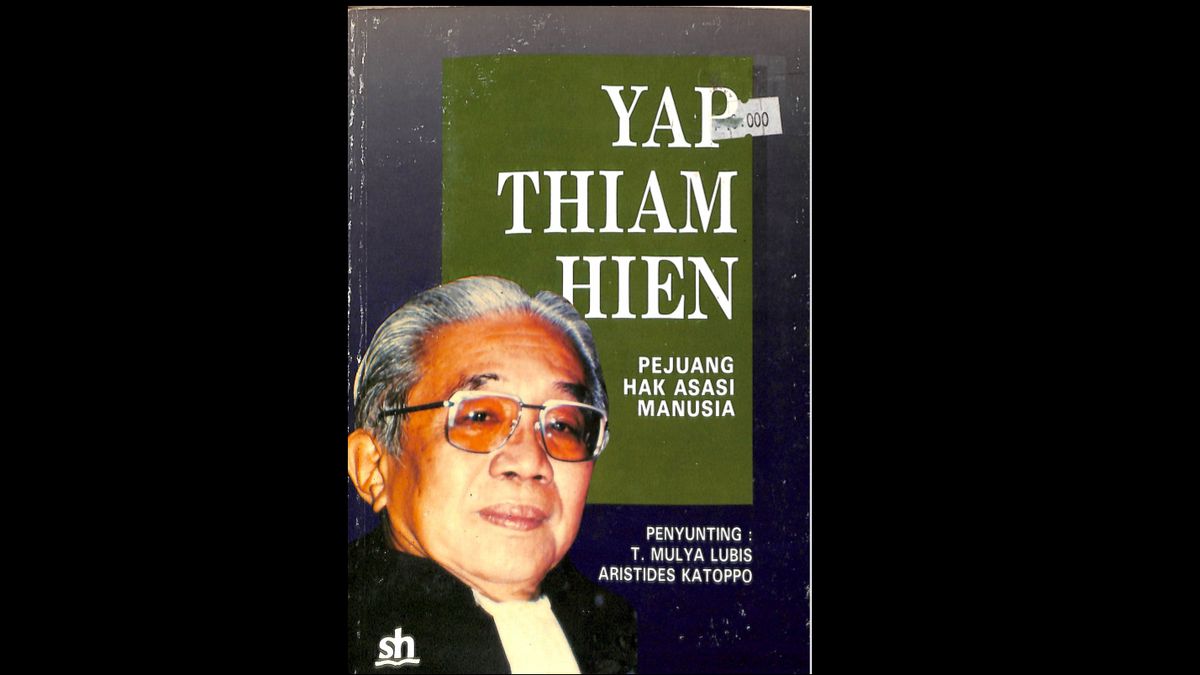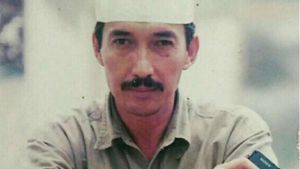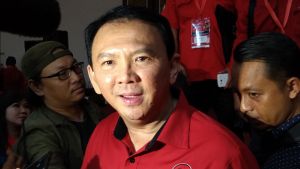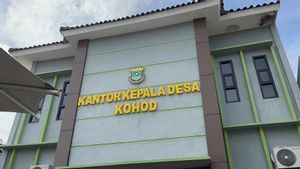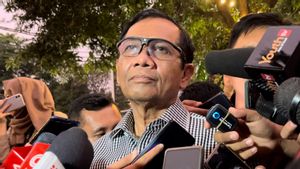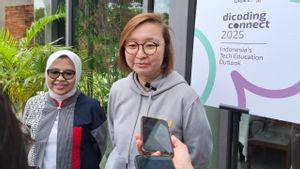JAKARTA - Talking about the struggle for Human Rights (HAM) in Indonesia is certainly incomplete if we don't know and talk about Yap Thiam Hien. His ideas, struggles and thoughts on human rights are still used as references to this day.
Yap Thiam Hien is a figure who is sometimes considered controversial because he defends the rights of all groups, both left and right, regardless of religion, ethnicity or race. The man who is familiarly called Yap, was born in Banda Aceh on May 25, 1913.
Yep was born from a wealthy family. His grandfather was a head of a Chinese group appointed by the Dutch East Indies government. This made it not difficult for Yap to get his education, he attended Europeesche Lagere School (ELS), then continued his education at Meer Uitgebreid Lager Onderwijs (Mulo).
His childhood education experience in a Dutch school made him aware of very strong racial discrimination. At school, Yap, who comes from the Chinese ethnicity, is always the subject of ridicule for Dutch classmates.
"I grew up in a feudalistic plantation environment. But my childhood was what made me hate arbitrariness and oppression." said Yap Thiam Hien as quoted from the book Chinese Figures and Indonesian Identity, by Leo Suryadinata.
Graduated from MULO, Yap then left Banda Aceh to study in Yogyakarta. He entered AMS A-II (SMA level) at this school. He studied German, Dutch, French and English a lot, and read books in a variety of languages that he mastered. Graduated from a Yogyakarta school, Yap taught at several schools, generally with many Chinese students, such as the Hollandsch Chinese Zendings School in Cirebon, and the Hwee Koan Chinese school.
After Indonesia's independence, in 1946 Yap went to the Netherlands to study. He majored in Law at Leiden and got the title Mr (Meester in de Rechten). Then he returned to his homeland, and worked as an advocate. This work that he struggled with until the end of his life.
As well as being an advocate, Yap Thiam Hien is also known as the founder of Baperki (Indonesian Citizenship Consultative Body), a mass organization for Chinese descent that was founded on March 13, 1954 in Jakarta, he was elected as Deputy Chairman of the central Baperki, with the General Chairperson Siauw Giuok Tjhan.
Yap's organizational journey in Baperki did not go smoothly, he contradicted Siauw's views, when Baperki as a neutral organization began to be drawn into politics under Siauw's leadership. According to Siauw, the marginalization of people of Chinese descent is a legacy of the Dutch colonialism, the way to eliminate it is to form a socialist society. This made Baperki ultimately pro-Soekarno and pro-communist, as a force that was considered to be the way to achieve Baperki's ideals by carrying out integrationist politics by supporting Sukarno's National Revolutionary program.
Even though Yap was a person who strongly agreed with pluralism, he did not agree with the way Siauw led Baperki, even more so with the way Siauw wanted to solve the problem of discrimination in Chinese people by establishing a socialist and pro-communist society. He stated that his concept in solving racial problems is by means of cleansing the heart, as opposed to brainwashing and changing the social structure of society. Yap also suggested that all discriminatory laws and regulations be eliminated immediately.
The clash of Yap Thiam Hien's thoughts with Siauw Giuok Tjhan became increasingly acute when Baperki supported Sukarno when he re-enacted the 1945 Constitution which contained the article on the Indonesian president that it had to be a native Indonesian, this article was considered by Yap to be very discriminatory and contrary to the principles and objectives of Baperki's struggle. For Yap, the principle of Baperki's struggle was very important, but for Siauw political reality was very important, Baperki needed Sukarno to realize Baperki's ideals by gaining power.
Quoted from the book Patterns of Chinese Activity in Indonesia, by Charles Coppel. In the Baperki congress, Yap submitted a motion of no confidence to Siauw, even though he knew that at that time the majority of the congress supported Siauw's leadership, but he never resigned, for him the principle of Baperki's struggle was more important than strategic matters. Finally Yap lost, he then resigned his position as Deputy Chairman of Baperki. Yap became a regular member of Baperki and began to be actively involved in the organization.
In 1967, Yap again made a scene when there was a polemic on the idea of the National Unity Development Institute (LPKB), about changing names for citizens of Chinese descent. The name change at that time was interpreted as an identification of the commitment of citizens of Chinese descent to commit to becoming Indonesian citizens.
Yap Thiam Hien opposes the idea of changing the name that was promoted by the LPKB and has been accommodated through government regulations. Through the 27 January 1967 edition of Sinar Harapan, he expressed his opinion that this name change would not eliminate the problem of discrimination against ethnic Chinese.
"It is naive to think that changing the name is a positive step towards the process of national unity. Also the process of assimilation / integration of the Chinese minority into the Indigenous majority is not a conditio sine qua non (an indispensable and important element) for national unity. It depends on other factors. name change is useful only for people who want to achieve some selfish personal goal of saving position, commerce, guaranteed school / university entry, and guaranteed future. Idealists who change their Chinese name may protest against the word -this strong word, but idealism can be deceived by verborgen wenssen (hidden will) and can become a victim of zelf bedrog (self-deception). Changing the name an sich is a right to personal freedom. No person or institution can force people to use a name this or that name. " said Yap Thiam Hien.
Yap's writing against the change of name was widely opposed by the Chinese descendants themselves as well as from the indigenous group, it was considered provocative and out of date. There are also those who oppose Yap, that changing names is not only a personal matter, but as a form of nationalism. They completely opposed Yap's accusation that the person who changed his Chinese name had a specific purpose. This attitude against Yap gave the impression that he was too upholding Chinese culture and did not really like the culture of the indigenous Indonesian people and was against intermarriage and assimilation.
Even though he and his family did not change their name, he actually really loved Indonesia. This can be seen from, Yap does not understand Chinese and puts forward Indonesian. More Yap hang out with all the natives. Likewise with Yap's political ideas which are always oriented to the progress of Indonesia.
Yap's attitude towards his impression of being anti-mixed marriages was denied when his son, Yap Hong Gie, married Tetty Kintarti in 1988, and even the wedding party used Javanese customs.
Yap Thiam Hien's progress when he became an advocate often appeared to defend people who were against the authorities and those who were oppressed by the authorities. During the Old Order, he urged Sukarno to release several political prisoners, such as Moh Natsir, Moh Roem, Mochtar Lubis, Sutan Syahrir and HJC Princen.
During the New Order era, Yap was appointed by Mahmilub (Extraordinary Military Court) to defend Dr. Subandrio who was accused of being involved in the G30S PKI. The task was accepted, he defended heavily Dr. Subandrio, although Yap was not an ally or sympathizer of Subandrio, let alone a PKI sympathizer, because he had opposed the idea of Communism while at Baperki. Yap is also someone who often criticizes the Sukarno-style Guided Democracy regime. At that time, many people wondered why Yap would want to defend people against him.
Yap criticized the demands for the death penalty against Subandrio that were filed by prosecutors in a military court. According to him, human life is a gift from God, so only God has the right to take human life.
Senior lawyer Todung Mulya Lubis said Yap was a figure of an advocate who was persistent in fighting for human rights without fear. Yep also never differentiated the people he defended based on ethnicity, religion, race and certain economic class.
"Pak Yap reflects an advocate with integrity who is not crazy about money, 100 percent advocate. He's not the type of advocate who likes to ride a Ferrari or Lamborghini. He also did not take Mercedez, ”said Todung Mulya Lubis, as quoted from the article of the International People's Tribunal 1965 (IPT 1965), 31 January 2017 edition https://www.tribunal1965.org/yap-thiam-hien-pembela-orang-miskin- non-ferrari-advocate-type /
If we look at Yap's struggles, we can see that he has one pattern in common, namely displeasure with excessive power. He adheres to Lord Action's belief that power tends to be corrupt (power tends to be corrupt). Because of this tendency, Yap always said the importance of realizing that Indonesia is a rule of law, not a state of power. With that frame of mind, Yap also founded the Human Rights Defenders Institute in 1966. Then he also founded the Legal Aid Institute (LBH) with Adnan Buyung Nasution in 1970.
Yap's defense activities are also not only in Indonesia, but also abroad, he is one of the founders of the Regional Council of Human Rights in Asia, and a member of the International Commission of Jurists. .
The myriad of achievements and defending human rights that he did during his life until his death on April 29, 1989 finally led the Foundation for the Center for Human Rights Studies to give the Yap Thiam Hien Award to people who contributed greatly to upholding human rights in Indonesia from 1992 to now.
The English, Chinese, Japanese, Arabic, and French versions are automatically generated by the AI. So there may still be inaccuracies in translating, please always see Indonesian as our main language. (system supported by DigitalSiber.id)
